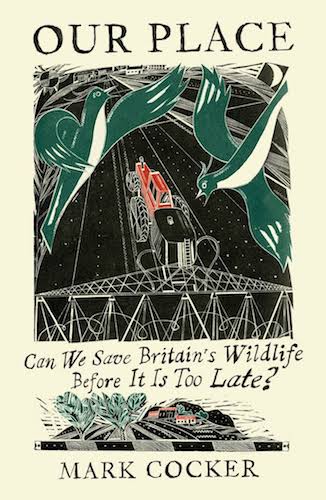
Charles Darwin’s most famous paragraph—the wonderful final paragraph of On the Origin of Species—begins with a description of:
an entangled bank, clothed with many plants of many kinds, with birds singing on the bushes, with various insects flitting about, and with worms crawling through the damp earth.
Darwin goes on to explain how these diverse lifeforms have evolved complex interdependencies. He is, in effect, describing a thriving ecosystem in a tiny section of the English countryside. It’s a lovely example of early ecological writing.
To read Mark Cocker’s Our Place: can we save Britain’s wildlife before it’s too late? is to realise Darwin’s entanged bank is no longer thriving. For a nation that prides itself on its love of the natural world, we Brits have let things slip in our own backyard. Things are far worse than they seem. Our green and pleasant land is struggling, and we are to blame.
Visiting particular locations by way of example, Cocker explores where it all went wrong. The usual culprits feature prominently: intensive farming, commercial forestry, an ever-growing population, exploitative land-owners, politicians, environmentally hostile subsidies, toothless legislation. The sheer number of different official designations for environmentally important sites also seems positively—perhaps deliberately—counter-productive.
More surprising, and shocking, to me was the failure of major environmental organisations to work together for the good of our countryside. Speaking as someone who spent many years trying (largely unsuccessfully) to get a number of different public-sector organisations to collaborate more closely, the problem of conflicting priorities between different environmental groups was disconcertingly familiar.
There have been occasional forward-thinking initiatives attempting to put more emphasis on the environment, such as diverting farm subsidies towards more environmentally friendly farming practices. (‘What the fuck is a twite?’ a hill-farmer once asked me, when they learnt there was money to be made allowing their fields to remain unkempt.) But such initiatives never seem to last long.
To a cynic like me, the problems seem insurmountable. Cocker offers a number of suggestions about where we should go from here, but there is little cause for optimism to be found in this book.
An important book, but a depressing read.
- Buy this book from Bookshop.org (UK) and help tax-paying, independent bookshops.
- Buy this book from Amazon.co.uk
- Buy this book from Amazon.com